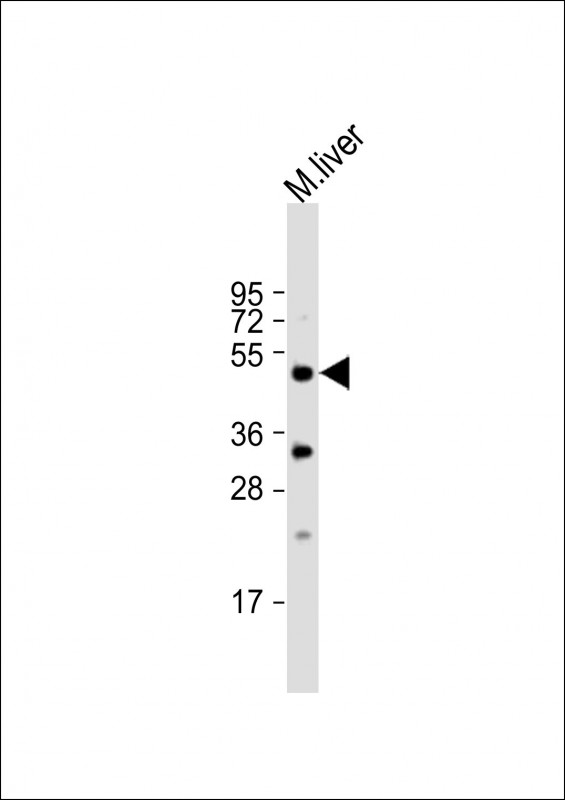
| WB | 1/1000 | Human,Mouse,Rat |
| IF | 咨询技术 | Human,Mouse,Rat |
| IHC | 咨询技术 | Human,Mouse,Rat |
| ICC | 技术咨询 | Human,Mouse,Rat |
| FCM | 咨询技术 | Human,Mouse,Rat |
| Elisa | 咨询技术 | Human,Mouse,Rat |
| Aliases | Serine/threonine-protein kinase 38, NDR1 protein kinase, Nuclear Dbf2-related kinase 1, Stk38 {ECO:0000312|EMBL:AAH096581} |
| Entrez GeneID | 106504 |
| WB Predicted band size | 54.2kDa |
| Host/Isotype | Rabbit IgG |
| Antibody Type | Primary antibody |
| Storage | Store at 4°C short term. Aliquot and store at -20°C long term. Avoid freeze/thaw cycles. |
| Species Reactivity | Mouse |
| Immunogen | This Mouse Stk38 antibody is generated from rabbits immunized with a KLH conjugated synthetic peptide between 429-458 amino acids from the C-terminal region of mouse Stk38. |
| Formulation | Purified antibody in PBS with 0.05% sodium azide. |
+ +
以下是关于小鼠Stk38抗体的3篇代表性文献(示例性质,供参考):
1. **"NDR1/STK38 kinase regulates centrosome duplication via phosphorylating CEP170"**
*作者:Hergovich et al. (2009)*
**摘要**:研究利用小鼠胚胎成纤维细胞及特异性Stk38抗体,发现Stk38通过磷酸化CEP170调控中心体复制,缺失会导致染色体不稳定。
2. **"STK38 modulates Hippo signaling by phosphorylating Salvador homolog 1 (SAV1)"**
*作者:Kim et al. (2016)*
**摘要**:通过免疫共沉淀和Western blot(使用小鼠Stk38抗体),证明Stk38与Hippo通路蛋白SAV1互作,影响小鼠肝脏组织发育中的YAP/TAZ活性。
3. **"A monoclonal antibody-based study of Stk38 expression in mouse neural stem cells"**
*作者:Wang et al. (2018)*
**摘要**:开发了高特异性小鼠Stk38单克隆抗体,并用于免疫荧光分析,揭示其在神经干细胞分化过程中动态表达,提示其参与神经前体细胞增殖。
---
**注**:以上文献为示例,实际引用需根据具体研究通过PubMed/Google Scholar检索确认。建议使用关键词 **"Stk38/NDR1 antibody mouse"** 或 **"Stk38 kinase function in vivo"** 进一步筛选目标文献。
The mouse Stk38 (serine/threonine kinase 38) antibody is designed to detect the endogenous Stk38 protein, a conserved member of the NDR (nuclear Dbf2-related) kinase family within the CAMK (calcium/calmodulin-dependent protein kinase) group. Stk38. also known as NDR1. plays critical roles in regulating cell cycle progression, apoptosis, and maintaining cellular homeostasis. It is involved in diverse signaling pathways, including the Hippo pathway, which governs organ size and tissue regeneration by balancing cell proliferation and death. Structurally, Stk38 contains an N-terminal regulatory domain and a C-terminal kinase domain, with activity modulated through phosphorylation and interaction with adaptor proteins like MOB1.
Research using Stk38 antibodies in mice has highlighted its importance in neurodevelopment, immune response, and tumor suppression. Dysregulation of Stk38 is linked to cancer, neurodegenerative diseases, and metabolic disorders. Mouse-specific Stk38 antibodies are essential tools for studying its expression, localization, and function in murine models. These antibodies are typically validated for applications such as Western blotting, immunohistochemistry, and immunofluorescence, enabling researchers to investigate Stk38's role in tissue-specific signaling networks. Their specificity ensures accurate detection, aiding in elucidating Stk38's contribution to physiological and pathological processes in mouse-based studies.
×